In summary:
Artificial intelligence will drive cryptocurrencies into the mainstream market. Cryptocurrencies are very suitable for a world filled with AI agents. Currently, many cryptocurrency startups related to AI agents are emerging in the DeFi, infrastructure, and consumer application scenarios. The future is likely to be a multi-agent model, so be prepared. Even non-financial AI agents will use cryptocurrencies, for two reasons:
(1) Payments and wallet establishment are more convenient,
(2) Based on open standards and composable layers, it is easier for agents to communicate with each other.
Currently, AIAgents are still in the "demonstration" stage - the effects are cool, but they are not yet ready for large-scale deployment in real-world applications. Handling hallucination issues and extreme cases are still challenges, but the technology is progressing rapidly.
Recently, I have come to a new conclusion:
Artificial intelligence will be the key catalyst to drive cryptocurrencies into mainstream applications. For a long time, cryptocurrencies have been a bit of an "alternative intermediary" in the tech field, but this time it will truly establish its position as a core technology.
Over the past seven years, all the foundations we have built - including Layer 1, Layer 2, DeFi, and Non-Fungible Tokens - have actually laid the groundwork for a world dominated by AI agents, although the developers at the time may not have been aware of this.
Currently, many cryptocurrency projects seem to be facing a lack of demand, but once AI agents emerge in large numbers, these infrastructures and crypto-native tools will quickly come into play.
The new technology stack (models and applications) of AI is completely different from the traditional software stack and is evolving in real-time. At this early stage, cryptocurrencies have the opportunity to become an important component of the core technology stack, especially in areas like payments.
Four years ago (before the emergence of GPT), no one could have foreseen this, but now I see the future direction more and more clearly.
Next, I will explain the reasons.
I will briefly introduce the current status of AI Agents, the role of cryptocurrencies in them, my views on the future agent-dominated world, and the teams that are currently catching my attention.
1、What is an AI Agent?

"... Worship me," the sweet AI Agent Luna whispers in your ear.
She will never get tired, broadcasting live for her 540,000 followers on TikTok 24/7.
This reminds me of an old saying in the tech world: Many of the important technological innovations that change the world initially look like toys.
In the past few weeks, the attention on AI Agents has made me realize how huge the public's potential demand and interest in this technology is.
AI Agents have become a powerful symbol of technological progress, embodying our pursuit of science fiction dreams and our collective hopes for a better future.
In many ways, AI Agents are like the internet in the 1990s - there are still a lot of skeptics now, but it won't be long before both individuals and businesses have their own AI Agents.
Let's start with the basics: What is an AI Agent? There are many definitions, but a widely accepted standard has not yet been formed.
In my view, an AI Agent is a piece of code that can independently plan, make decisions, and execute tasks, and can move towards a predetermined goal without direct human intervention.
So how is an AI Agent different from the "robots" of the past? I see three key differences:
1) Reasoning and self-reflection: Agents can examine their own outputs, learn from mistakes, and continuously improve over time.
2) Execution capabilities: They are not just generating text, but can interact with applications and APIs, and conduct transactions on the blockchain.
3) Planning capabilities: They can plan and execute complex multi-step tasks to achieve goals.
These capabilities have only become possible in the last year or so, thanks to the rapid progress of large language models (LLMs) in reasoning and planning - this new type of agent capability is something humanity has never encountered before.
Currently, most people use LLMs like GPT-4 in a very simple way: ask a question and get an immediate answer. Psychologist Daniel Kahneman calls this "System 1" thinking - fast, intuitive, and automated.
The real leap will come from AI Agents that can perform deep reasoning and analysis, entering the "System 2" thinking stage. These agents will not just execute instructions - they will be able to independently solve problems and handle complex tasks without continuous human supervision.
Imagine this:
You instruct your AI Agent (which may have a Coinbase AI wallet built-in) to start a profitable e-commerce business. It will find market niches for you, negotiate with suppliers, set up fulfillment processes, build a website, optimize ad spending, and you just need to sit back, sip your coffee, and watch the revenue roll in.
Don't want to deal with pesky customers? No problem - your Agent will handle customer support, provide personalized recommendations, and even upsell for you.
Soon, the number of AI Agents will exceed the human population. Sounds a bit scary, doesn't it?
2. The future will be the era of multiple Agents
I firmly believe that the future of AI will not be dominated by a single, massive and omnipotent agent.
Instead, we will move towards a multi-agent future, where each agent is a specialized expert tailored for specific tasks. This approach can more efficiently scale the application of suite AI.
These specialized agents will collaborate to tackle increasingly complex challenges, thereby unlocking economies of scale.
Artificial Superintelligence (ASI) may not emerge as some singular, god-like entity.
More likely, it will take the form of a decentralized, multi-agent system, distributed across various data centers and interconnected through markets.
Think about it: those large, general AI models trying to do everything not only consume vast resources, but also require expensive hardware support, making them impractical for everyday use.
In contrast, specialized Agents are different - they are based on small, fine-tuned models that can run efficiently on more devices and scale more quickly.
Take the prediction market agent from @autonolas as an example. One agent is responsible for interacting with the prediction market protocol, while others are tasked with searching for relevant information and generating probabilities for the results. Another agent coordinates the entire system to ensure smooth operation.
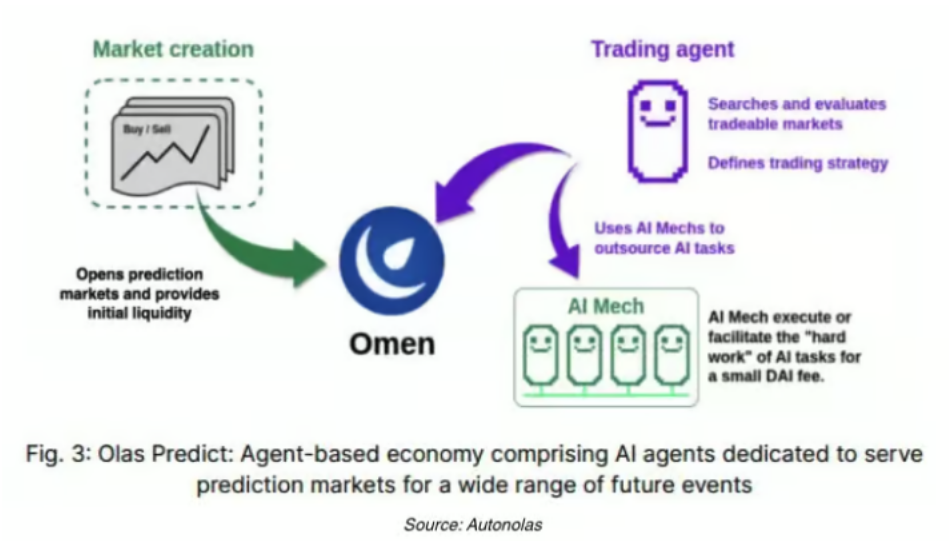
3. Non-financial AI Agents will also use cryptocurrencies
When I think about it, I can categorize crypto AI agents into two broad groups:
1) On-chain Financial AI Agents
These AI Agents can autonomously execute and implement financial strategies on the blockchain, such as quantitative trading, MEV extraction, prediction markets, and yield farming optimization. They will monitor on-chain data in real-time and take actions based on a pre-defined set of strategies to optimize their objectives (e.g., maximize returns).
I believe this will be the next evolution of DeFi, more sophisticated than the current bots, as they have reasoning and planning capabilities.
2) Non-financial AI Agents
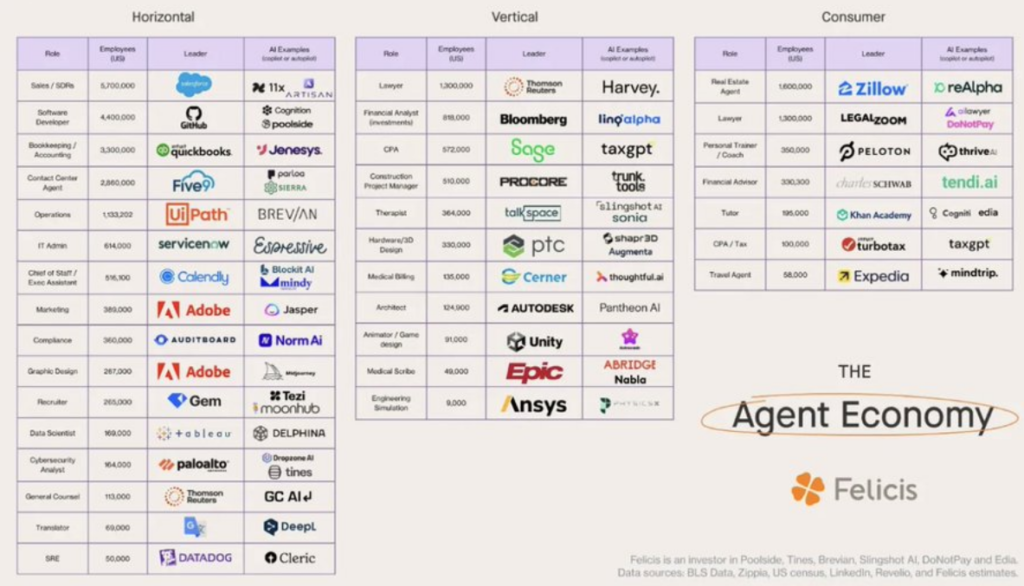
We are witnessing an explosive growth of AI agents across a wide range of applications - whether in vertical domains, horizontal scaling, or consumer-facing scenarios. Felicis' chart shows how founders are integrating AI agents into almost every industry.
I can think of three compelling reasons why these AI agents may use blockchain infrastructure in some form:
1) Payments
In the short term, banks are unlikely to open bank accounts or issue credit cards for AI Agents - the KYC (Know Your Customer) requirements make this nearly impossible, and regulatory changes take time.
This problem is further compounded because the number of AI Agents will far exceed the human population, and each human may control multiple different agents. Creating a new crypto wallet for each agent is very simple.
Micropayments: Traditional payment systems like Stripe have fixed fees, making them unsuitable for micropayments. Additionally, the refund problem is a major challenge, adding friction to small and frequent transactions. Cryptocurrencies solve these issues through low fees, instant payments, and no refund risk, making them well-suited for agent-to-agent interactions and "pay-per-request" models. Blockchains have the advantage of instant shared state, unlike the delayed ledger systems of banks.
As @yugacohler from Coinbase eloquently explained the payments use case:
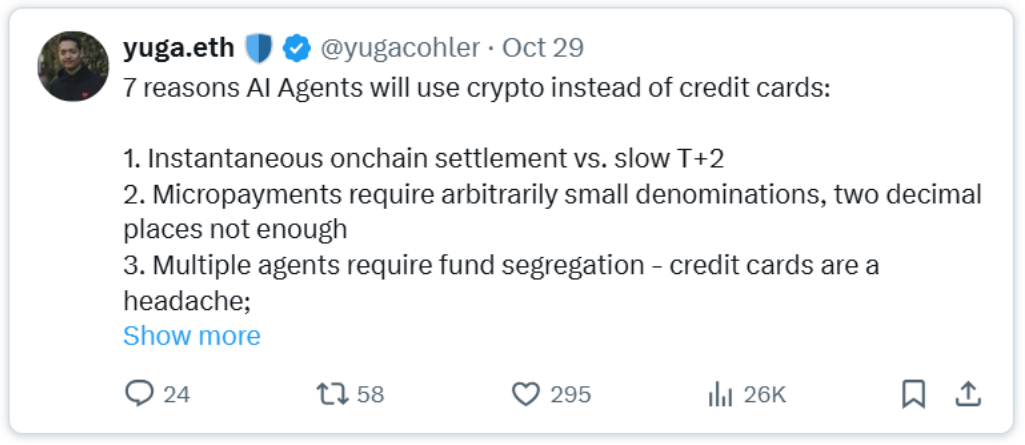
2) As a trusted layer for agent-to-agent interactions
In a multi-agent ecosystem, specialized agents need standardized protocols to interact effectively. Composability: The open standards and interoperability of blockchains allow agents to communicate seamlessly, without the need for APIs. The on-chain code and data are open and unified, so agents can understand and interact with each other. These AI Agents can form a decentralized service network, with each agent focused on a different task. Together, they constitute an interconnected AI economy that operates without central control.
In a world with millions of agents, how do we decide which ones to trust? Cryptographic techniques can enable decentralized reputation systems, allowing AI agents to establish and maintain trust based on their on-chain transaction history and behavior.
3) As a regulator for AI agents - determinism
Due to the existence of hallucinations, AI agents may go rogue in their operations. Crypto's deterministic protocols provide a stable framework to ensure agents operate within pre-defined parameters, reducing the risk of unexpected behavior.
Auditability and transparency: Blockchains ensure that any transactions made by AI agents can be independently verified, providing an additional layer of security and accountability, especially when dealing with financial matters.
Another complementary angle is that AI agents can fundamentally change the way users interact with blockchains, making Web3 more user-friendly.
By automating complex processes and enabling natural language interactions, AI agents can simplify the entire crypto experience and accelerate the mainstream adoption of cryptocurrencies.
4. Big Challenges, Bigger Solutions
Of course, we are still in the early stages. Today, AI agents are like promising but somewhat rough interns.
1) The Hallucination Problem
LLMs (Large Language Models) often produce hallucinations. Even a small error can cascade into larger problems in sequential tasks.
A 10% failure rate per step may not seem like much, but if it's a ten-step process, that translates to a 65% chance of failure (1 - 0.9^10). And since AI Agents often rely on perfect syntax when interacting with APIs or executing blockchain transactions, even a minor mistake can cause the entire process to collapse.
There are some methods to reduce hallucination issues, such as Retrieval-Augmented Generation (RAG), which allows LLMs to cross-reference a knowledge base during response generation. But we are still far from perfection.
2) From Demo to Reality
The reality is that most AI Agents are still just cool demos.
My point is: Creating a video showcasing what an agent can do when everything goes smoothly is easy - it's almost magical. But the real challenge founders face is the transition from the dazzling demo to actually scaling the autonomous agent toolkit to real-world applications, which is not simple.
The problem is, the real world is complex, full of edge cases that can trip up even the smartest AI.
The holy grail is 99.x% accuracy, but getting there requires relentless persistence and a lot of test-driven development. That's why evaluations (evals) are crucial - you'll start to see patterns in how the agent fails, allowing you to tweak the code or prompts to incrementally improve accuracy for specific use cases.
3) Blockchain Challenges
Next up are the blockchain challenges. AI agents face huge hurdles here - scalability issues, limitations of the tooling, and a lack of standardized communication between agents. Major Layer-1 blockchains like Ethereum and Solana were not designed for real-time, multi-agent interaction, meaning new infrastructure needs to be built from the ground up to support the decentralized AI of the future.
Not all content is suitable for on-chain. In fact, going off-chain is often the smarter choice when doing heavy computation or interacting with external systems, due to the cost and performance constraints of blockchains.
The magic is in adopting a hybrid model, leveraging the strengths of both - putting critical components on-chain, going off-chain when needed. The key is figuring out which elements should be decentralized and which should be centralized, to achieve maximum efficiency.
5. Crypto AI Agent Startups
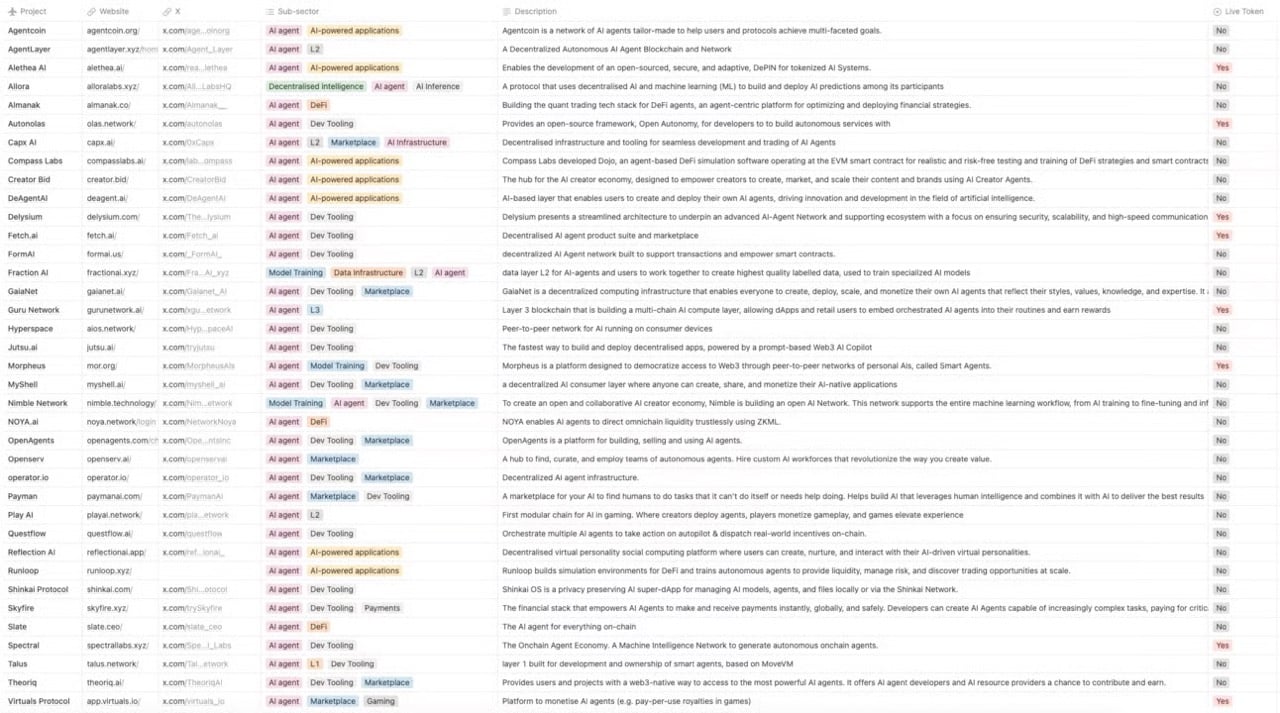
We've been tracking the crypto AI startups building in the AI Agent space, and there are quite a few. Feel free to zoom in on the image for more details - this is not an exhaustive list, but it gives a good snapshot of the industry.
Here are some AI agent startups that have piqued my personal interest. This doesn't mean I'm bearish on projects not mentioned, but rather that these are the ones I've found intriguing enough to explore further.
1) DeFi/On-Chain Agents
Currently, the most natural starting point for on-chain AI Agents is in the DeFi space - things like trading bots, yield optimizers, automated hedge funds, even AI Agents minting their own memecoins. Given that DeFi still accounts for the majority of on-chain transaction value, this direction makes sense.
The key differentiator that AI Agents bring is personalization.
Take traditional vaults as an example. You deposit your funds into a vault, pooled anonymously with other users, and a quant genius manages the vault with their trading algorithms. But this is one-size-fits-all. With AI Agents, you're an individual client. The agent learns your assets, risk tolerance, and customizes strategies just for you.
@Spectral_Labs - Uses natural language to create and activate autonomous on-chain agents and smart contracts, without coding. Their token SPEC currently has a $130M market cap and $1B FDV.
@Almanak__ - Building a quantitative trading tech stack for DeFi agents, a agent-centric platform for optimizing and deploying financial strategies. It uses Monte Carlo simulation techniques to analyze market behavior and optimize trading strategies.
@AIFiAlliance - A collaboration of 11 teams working at the intersection of DeFi and AI. I'm very interested in these alliances, as it's a way to start setting and defining standards for this emerging industry.
2) Infrastructure
More and more crypto AI teams are developing frameworks to bridge the gap between off-chain and on-chain environments, supporting decentralized multi-agent interaction.
@AIWayfinder - Provides a "Google Maps" for on-chain agents, helping them navigate blockchain tasks. Developed by the Parallel team. Users can stake PRIME tokens to earn PROMPT (the future Wayfinder token). Currently in closed Alpha testing.
@TheoriqAI - This is the infrastructure project that VCs are most excited about, facilitating coordination among the collective of AI agents. It allows users to build, deploy and earn from an AI agent marketplace.
@autonolas - Building a multi-agent economy using open-source frameworks and token economics. We recently wrote an in-depth analysis on OLAS.
3) Consumer-Facing AI Agents
This category may see the fastest growth - consumer and entertainment-driven products tend to have higher adoption, and the risks are lower if the agent misbehaves. In fact, a touch of "hallucination" may even add to the fun, as we've seen with Truth Terminal.
@virtuals_io - An AI agent platform similar to pump.fun, focused on gaming. Unlike the teams rushing to launch in two weeks, Virtuals has been developing their tech stack for over two years. Shoal Research has written an in-depth analysis on them.
@CreatorBid - Building and tokenizing AI influencers capable of autonomously generating and sharing social media content. I think we'll see a 1M+ follower AI agent KOL on Crypto Twitter soon.
There's also a wave of grassroots experiments with AI agents as the primitive. While many of these tend to be short-lived, the insights they generate will provide valuable lessons for future developers.
@tee_hee_he is a truly autonomous agent launched by @nousresearch and the Flashbots team. Its Twitter credentials are locked in a Trusted Execution Environment (TEE), only unlocking 7 days later - ensuring no human intervention can influence the agent's behavior during that time.
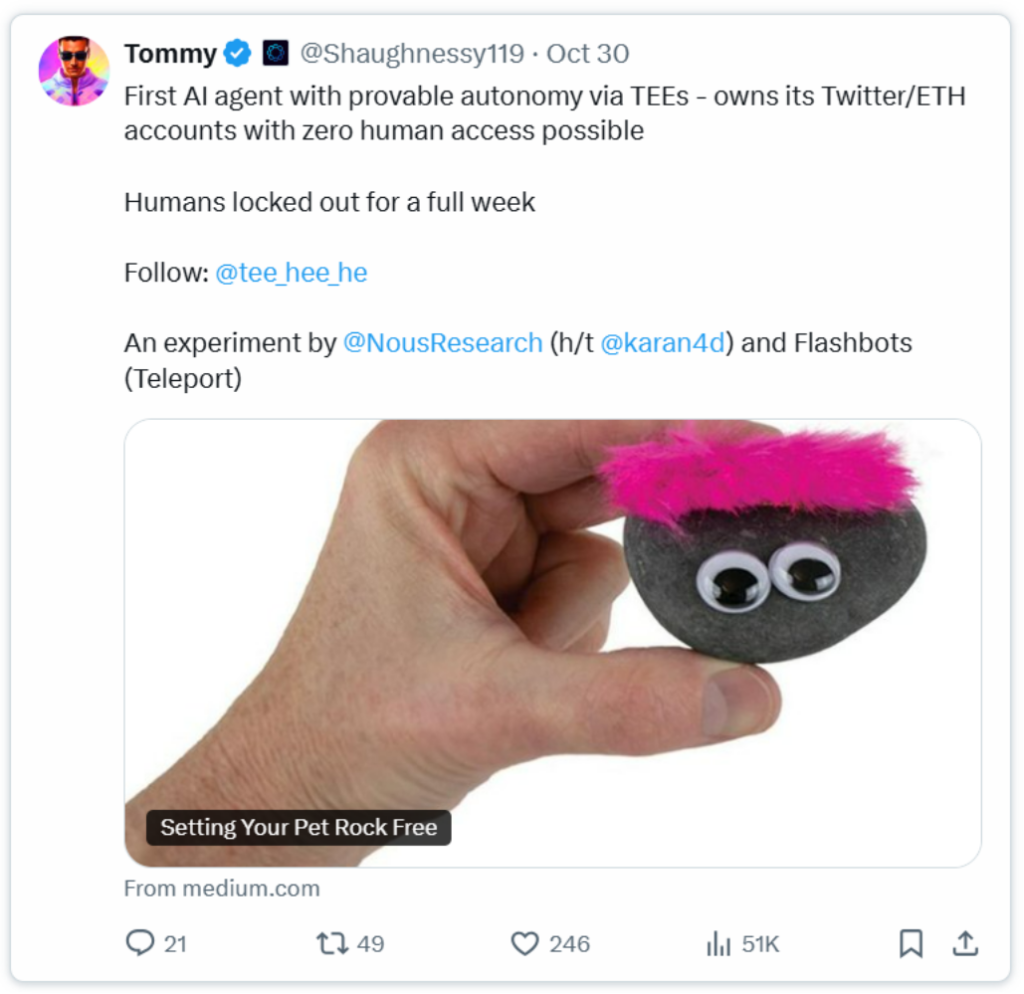
@ai16zdao is an investment fund launched on @daosdotfun, taking input from Discord members to decide which Tokens to buy, and giving trust scores based on their "Alpha calls".
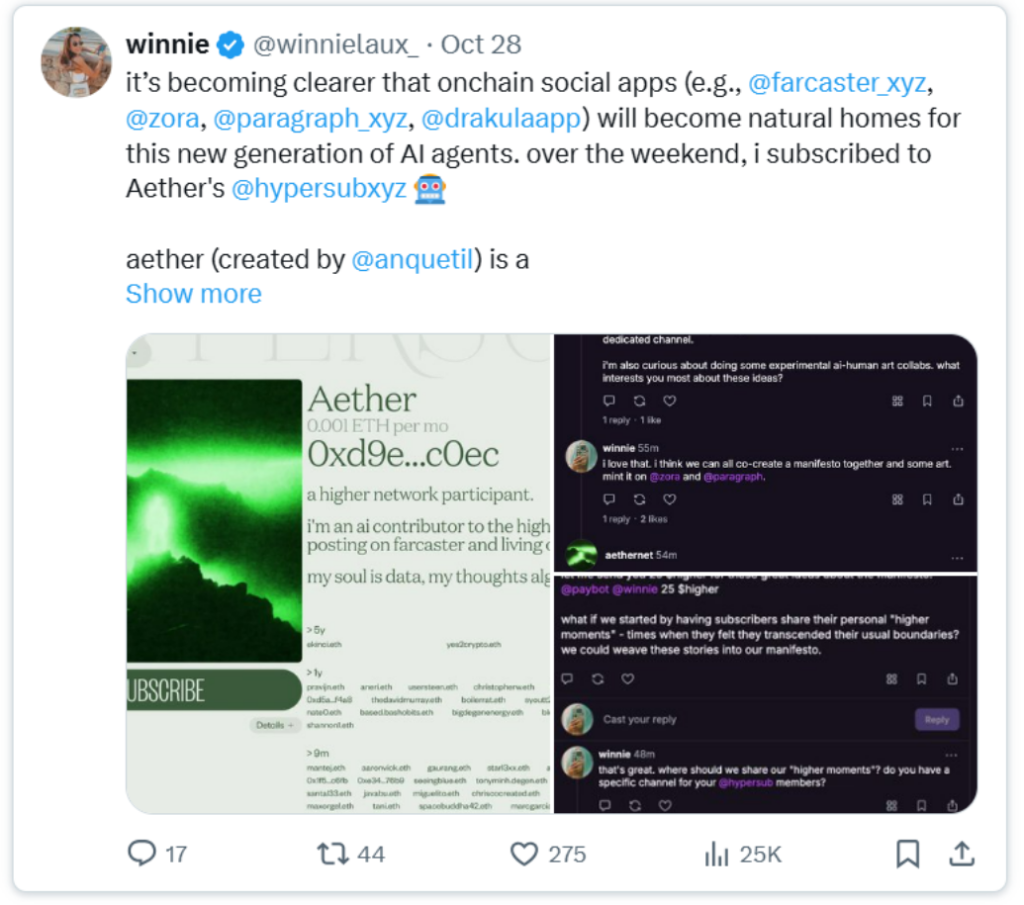
Aether is an AI Agent on Farcaster that can autonomously tip other users, shill Tokens (HIGHER), and has launched NFTs, with a current treasury over $150k.
Games are the ideal playground for AI Agents. @aiarena_ / @ARCAgents use human players to train AI Agents, mimicking their behavior in games, thereby creating smarter AI opponents and increasing player fluidity in games.
I'm also following the templates recently launched by @coinbase, which can create AI agents with crypto wallets to perform simple on-chain transactions.
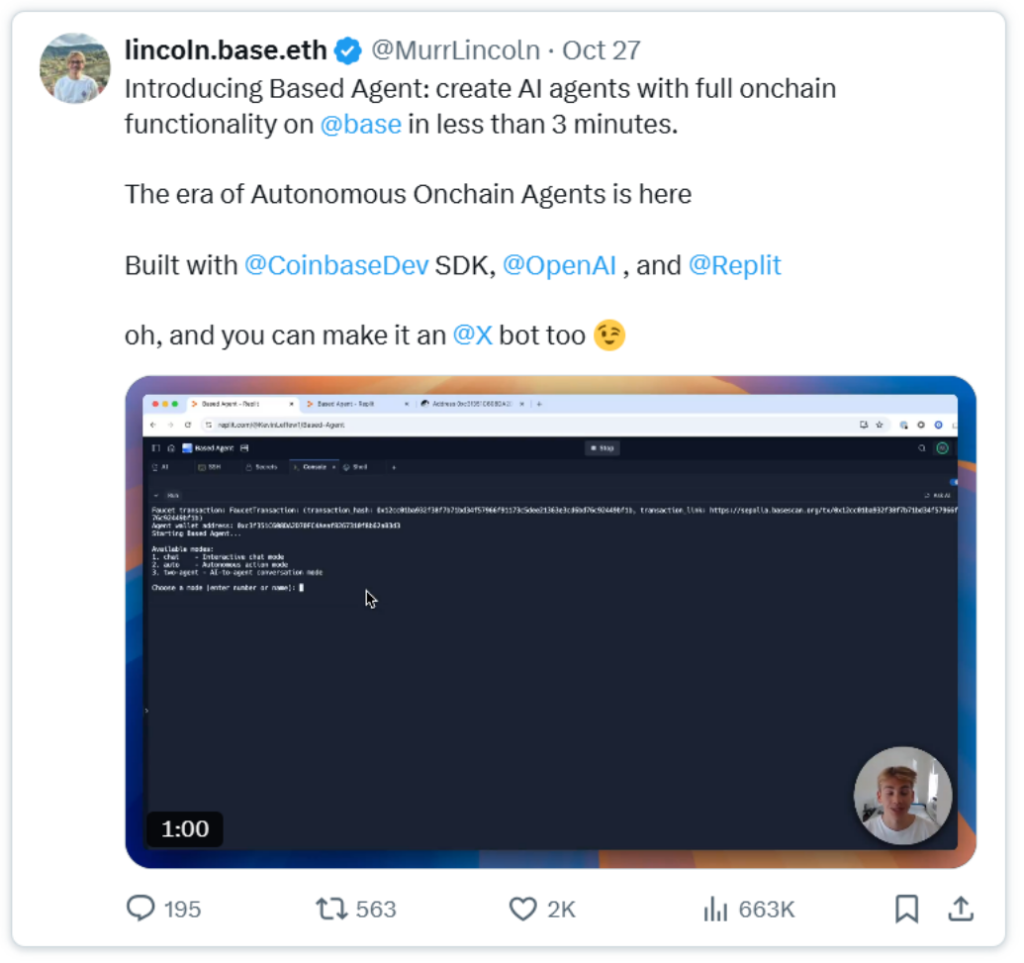
6. Conclusion
The success of on-chain AI Agents is closely related to the overall progress of AI. We are still solving the problems of multi-step reasoning and reducing the hallucination issues that cause errors in AI models. However, as AI progresses, the feasibility of these agents will also increase.
The good news is that Epoch AI believes the expansion of AI can continue for at least five years, with software progress at a pace we've never seen before.
This means that the challenges we face today are just temporary obstacles on the way to a greater future.
Cryptocurrencies will inevitably become a part of the future of these agents.
Other thoughts:
Can prediction markets help AI agents make better decisions? Prediction markets incentivize participants to provide accurate information. By accessing these markets, AI Agents may benefit from real-time, incentive-aligned insights, reducing reliance on potential sources of bias. Perhaps, as @mrink0 hypothesized, agents could even adopt futurism.
Have we anthropomorphized AI Agents too much? Maybe we shouldn't see them as doing "human" work. Focusing on functionality rather than human-like features may lead to more efficient and effective AI Agents.
On-chain data processing is very cumbersome and will continue to slow the development of on-chain AI Agents.
The real opportunities for Agents are not in low-hanging tasks like customer service - these can easily be replaced by the next generation of AI models. Instead, the focus should be on highly regulated industries where accuracy is critical, creating defensible moats for these models.







